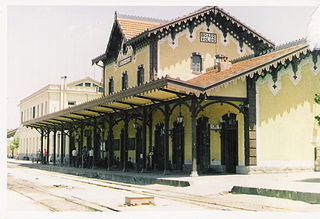
This article from the Guardian illustrates nicely the difference between what we want– goods (“wealth” in terms of political economy) and services– vs. money. Money is a medium of exchange, which we can use to obtain wealth and services, but in itself it really isn’t capable of satisfying our desires. The particular example here is from the town of Volos, whose railway station is pictured.
I could imagine Greece not formally dropping the Euro, but just kind of abandoning it, using local currencies, perhaps eventually united into a new Drachma. It’s not clear from the article whether their government is attempting to tax the alternative-currency transactions. The wiser course would be to tax economic rents instead of transactions, and that could be done in whichever currency is most practical.
You seem to class “goods” and “services” in the same category. I take it that Georgists don’t accept the distinction between productive and unproductive labor, which is found in all the classical economists on whom George drew?
“I could imagine Greece not formally dropping the Euro, but just kind of abandoning it, using local currencies, perhaps eventually united into a new Drachma.”
I don’t see how that works, given that Greek debt is denominated in euros. If local currencies are elastic, they won’t be fixed at a steady euro value. If they aren’t elastic to the current situation, what’s the point of using them? But if they can’t be pegged to euros, debtors who accept payment in local currencies will see the real value of their debt grow in magnitude. No?
Thanks for your comment, Will. George himself recognized and seemed to accept the distinction.
“Wealth is not the sole object of labor, for labor is also expended in ministering directly to desire; but it is the object and result of what we call productive labor — that is, labor which gives value to material things.” (Progress & Poverty, Book I Chapter 2). In a footnote of the previous chapter he writes: “We are speaking of labor expended in production, to which it is best for the sake of simplicity to confine the inquiry. Any question which may arise in the reader’s mind as to wages for unproductive services had best therefore be deferred.”
Of course he never really addressed it in P&P. Much, probably most of what modern beancounters classify as “services” is really part of production, such as the mechanic who makes machines more valuable than they’d otherwise be by fixing them, or the lawyer who negotiates contracts for productive activities, etc. However it is certainly true that some services are completely independent of wealth, such as a live stage show.
Many modern Georgists approach this problem by just appending to “wealth” the term “services,” where appropriate. For instance see the definitions here. Another approach is to note that, even when services are rendered directly, they have value only because someone is willing to exchange wealth (or money, a representation of wealth) for them.
If we solve the problem of poverty so that everyone has adequate wealth, we can be confident that everyone will manage to get enough services too.
As for your other comment, of course abandoning the Euro will likely make it impossible for debtors to pay the full Euro-equivalent of their debts. But it seems to be already impossible, in which case at least a partial default is unavoidable.
insurance and credit are often considered non-productive service. i view such as not necessarily a non-productive service but an important yet simple service often corrupted with a real need for a public or non-profit option.
nice article. they might not be able to pay their debts in euros, but hopefully they’ll have enough euros to pay their taxes and continue to work and function on alternative currency.